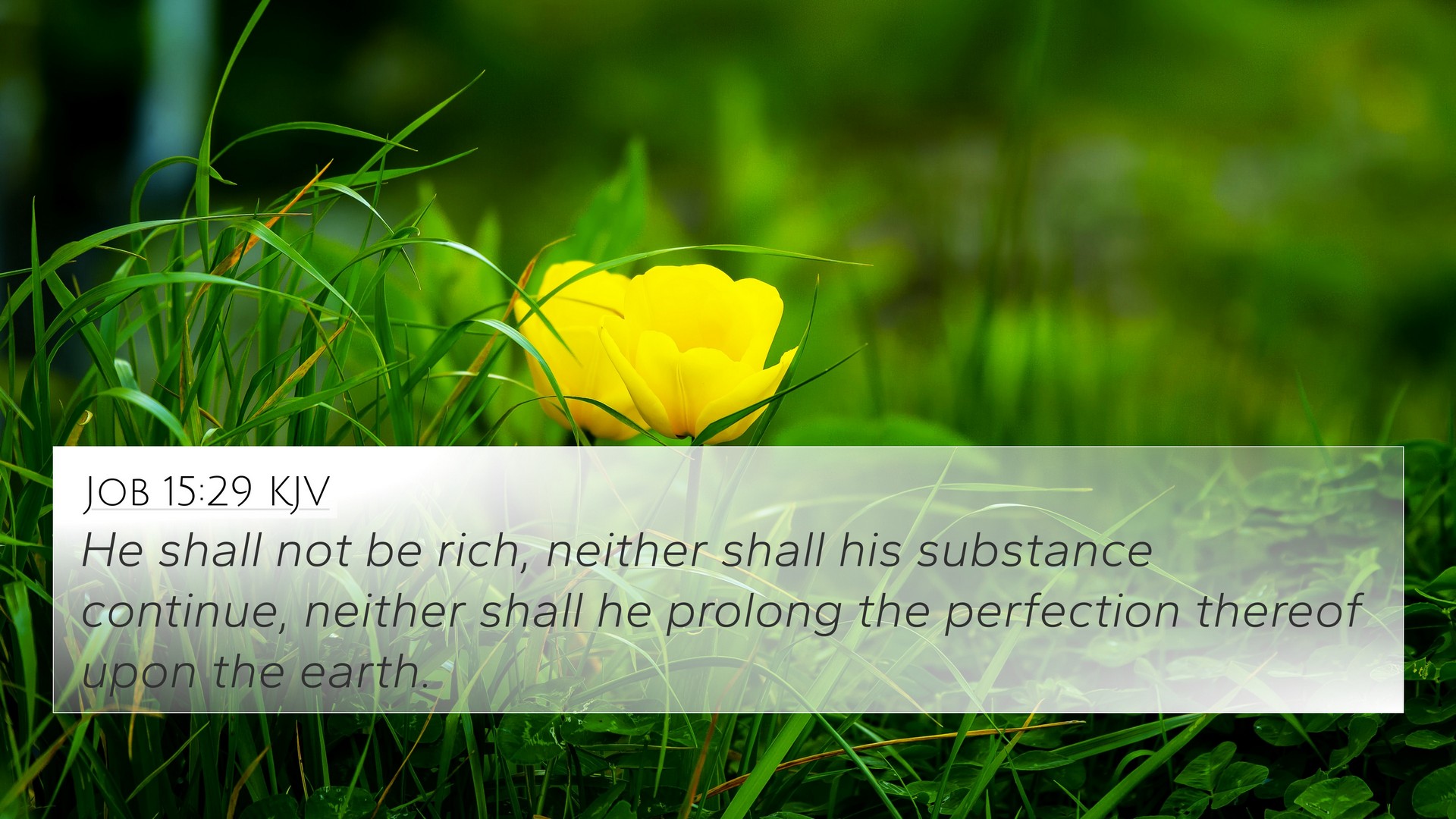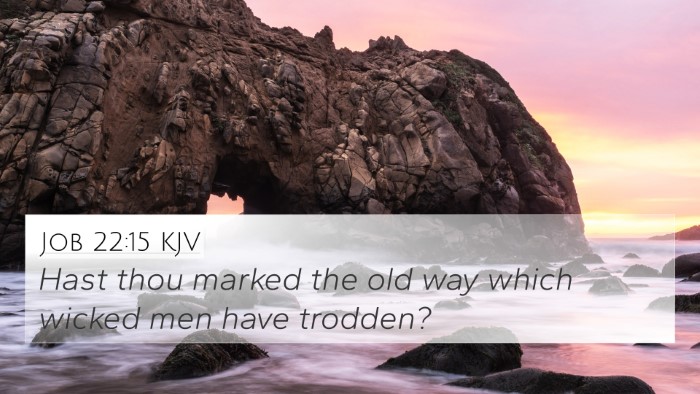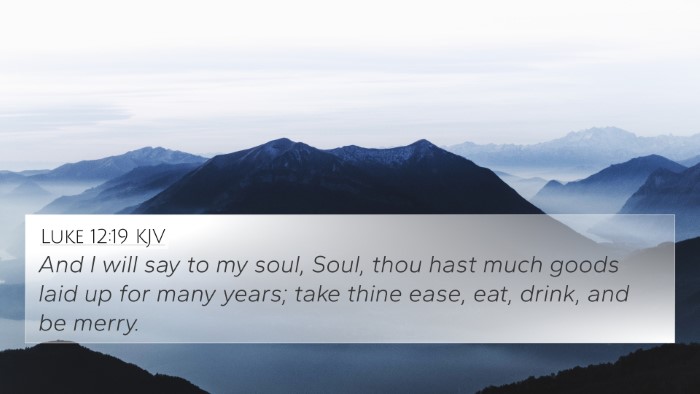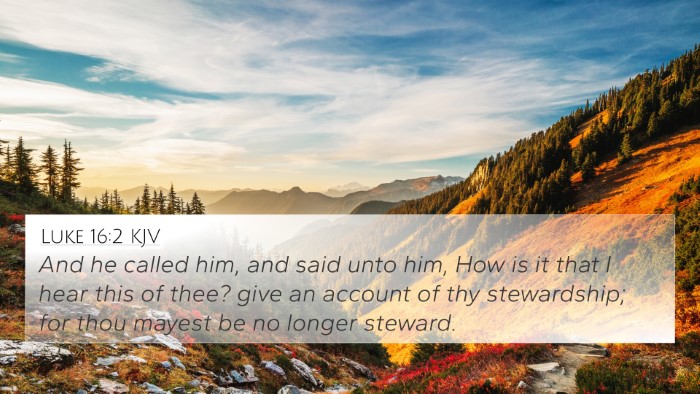Understanding Job 15:29
Job 15:29 states, "He shall not be rich, neither shall his substance continue, neither shall he prolong the perfection thereof upon the earth." This verse speaks to the transient nature of wealth and the ultimate outcomes for the wicked.
Summary of Insights
In examining Job 15:29, we are presented with several interpretations that can be drawn from respected public domain commentaries. The verse highlights key themes regarding wealth, the fate of the ungodly, and divine judgment. Below, we explore these insights.
1. The Fate of the Wicked
According to Matthew Henry, this verse conveys that the wicked shall ultimately face God's judgment, which will lead them to a poverty that transcends just material loss. Their essence and existence are linked to divine retribution, suggesting a loss that is both physical and spiritual.
2. The Illusion of Prosperity
Albert Barnes emphasizes the transient nature of wealth, noting that no amount of earthly riches can ensure everlasting security or peace. This echoes the broader biblical principle that earthly treasures are often fleeting and unreliable.
3. The Certainty of Judgment
Adam Clarke elaborates on the inevitability of God's judgement, reinforcing that wealth, when not used righteously, comes with dire consequences. Clarke refers to various scriptures that substantiate the idea that the wicked will not endure the trials of their wealth.
Connections and Cross-References
Job 15:29 intersects significantly with several other scriptures, creating a rich tapestry of biblical teachings. Here are important Bible verse cross-references related to this verse:
- Psalms 37:16: "A little that a righteous man hath is better than the riches of many wicked."
- Psalms 52:7: "Lo, this is the man that made not God his strength; but trusted in the abundance of his riches, and strengthened himself in his wickedness."
- Proverbs 11:28: "He that trusteth in his riches shall fall: but the righteous shall flourish as a branch."
- Proverbs 23:4-5: "Labour not to be rich: cease from thine own wisdom. Wilt thou set thine eyes upon that which is not? For riches certainly make themselves wings; they fly away as an eagle toward heaven."
- Isaiah 23:17-18: "And it shall come to pass after the end of seventy years, that the Lord will visit Tyre, and she shall turn to her hire, and shall commit fornication with all the kingdoms of the world upon the face of the earth."
- 1 Timothy 6:9-10: "But they that will be rich fall into temptation and a snare, and into many foolish and hurtful lusts, which drown men in destruction and perdition. For the love of money is the root of all evil."
- Matthew 6:19-21: "Lay not up for yourselves treasures upon earth, where moth and rust doth corrupt, and where thieves break through and steal: But lay up for yourselves treasures in heaven."
Thematic Connections
These references collectively establish a theme of the futility of earthly wealth, providing a clear message that riches do not equate to security or favor in the sight of God. By linking Bible verses that relate to each other, we can understand the consistent biblical narrative about wealth.
Comparative Analysis
Conducting a comparative Bible verse analysis reveals the intricate dialogues across the scriptures, emphasizing that God's perspective on wealth is consistent throughout. The message is not confined to the book of Job but resonates through other texts in both the Old and New Testaments.
Tools for Study
Utilizing tools for Bible cross-referencing such as Bible concordances and Bible cross-reference guides can significantly enhance one’s understanding of Scripture. Here are tips on how to effectively use these tools:
- Search for key terms within particular verses.
- Explore cross-references provided in the margins of study Bibles.
- Utilize online Bible search tools that allow for word searches across different translations.
- Engage in cross-reference Bible study by examining related themes and verses.
Conclusion
Job 15:29 serves as a critical reminder of the fleeting nature of earthly treasures and the enduring truth of divine justice. Through a meticulous study of Scripture and the use of cross-referencing, one gains richer insight into God's Word, allowing for deeper understanding and application in life. Ultimately, this verse compels us to reassess our values and to place trust not in wealth but in the eternal promises of God.
This comprehensive study of Job 15:29 and its related verses emphasizes the importance of cross-referencing Biblical texts to gain a holistic view of scriptural teachings on wealth and righteousness.











